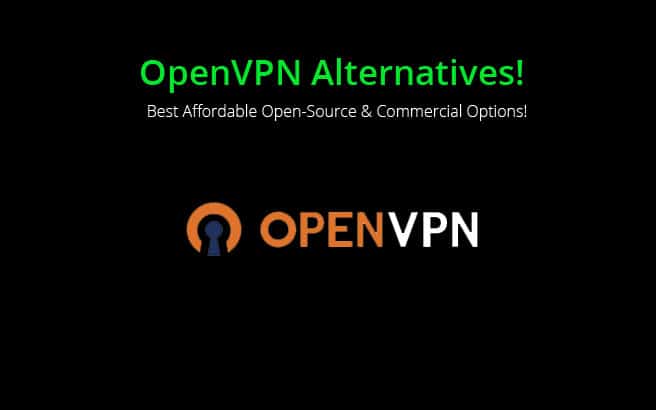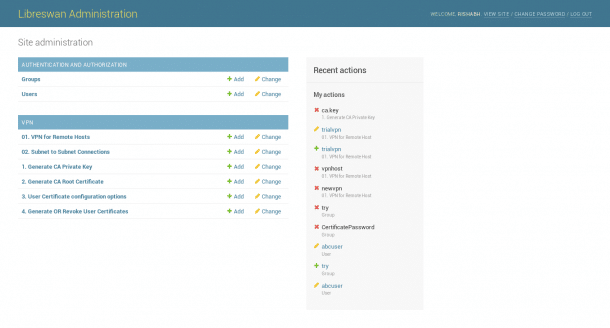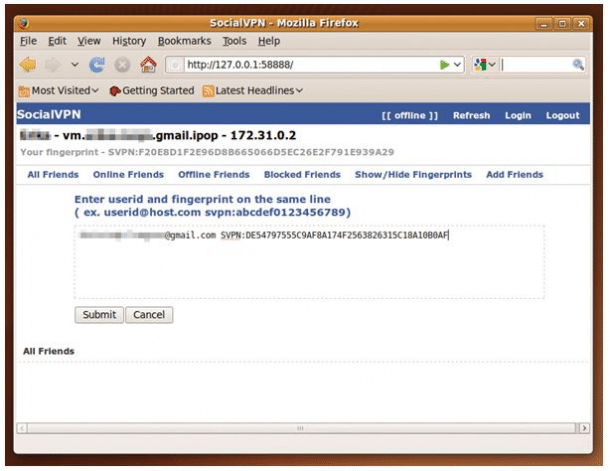Today we’ll be diving into some alternatives to OpenVPN and how they stack up against it in terms of security, options and more!
Virtual Private Networks (VPNs) are beneficial and include a wide range of functions to maintain the privacy of your geo location and browsing history.
Not just that, it also helps in tunneling over firewalls/blocked sites and seamlessly accessing online streaming websites.
For that, it has different authentication methods that use certificates, secret keys or unique ID for passwords or usernames.
Now, there are myriads of open-source and free VPNs flooding in the market, each one claiming to be the best.
So, if you are one of those people looking for an easy-to-use, open-source VPN alternatives, you’ve come to the right place!
Below we have found the Best OpenVPN alternatives based on their security, privacy, speed and encryption functions.
Here’s a list of the OpenVPN Alternatives in 2024:
1. Libreswan
Libreswan is a leading and popular open-source VPN alternative that supports common protocols such as IKE and IPsec. The ready-to-use package of Libreswan is available on Red Hat Linux distributions. It has been available for consumers since 15 years and is still recognized as one of the top-rated VPN to exist.
IPsec is a meticulous protocol suite that mainly works to secure encrypted data that’s being shared between two parties. Whereas, the IKE executes secure authentication and dynamic key generation for seamless data flow. Both these standard suite protocols are created and maintained by the IETF (Internet Engineering Task Force).
Libreswan has a wide range of security features and uses opportunistic encryption techniques, ideal for low to medium level encryption needs. Since it is built with peer-to-peer technology and uses repository files and tarball, the setup of Libreswan is easy.
Libreswan Features:
- Supports NSS crypto library
- Supports public key-based authentication
- Supports IKEv1 and IKEv2
- Supports pre-shared, key-based authentication
- Free software implementation
- Runs on Apple OSX, FreeBSD and Linux 2.4 to 5.x
- For Linux, it makes use of inbuilt XFRM IPsec stack
Visit Website:
Download package:
https://download.libreswan.org/
2. OpenConnect
Here’s another open-source SSL VPN client viz. OpenConnect that is created for Linux, Windows and various Linux distributions. Just like Libreswan, OpenConnect is also one of the oldest VPNs and is still under active development.
Initially, it was built as a replacement VPN client for Cisco’s AnyConnect SSL VPN. But later on, with much support, it became standard for various VPNs.
OpenConnect is based upon SSL security protocol, which makes it an excellent alternative. Likewise, with its comprehensive features, you can implement your own server, initiate data encryption, import various server configurations, etc.
OpenConnect Features:
- Built upon SSL security protocol
- Supports data encryption
- Allows import of server configurations
- Open-source, Free
- Supports connection via HTTP proxy, along with support for libproxy for automatic proxy configuration
- Authentication through HTTP forms or using SSL certificates
- Automatically detects IPv4 and IPv6 addresses, routes.
- Best Cisco and Pulse Secure VPN alternative for Linux users
Visit website:
https://www.infradead.org/openconnect/
Download package:
http://ftp.infradead.org/pub/openconnect/
3. Openswan
Openswan has been a popular VPN alternative for a Linux user right from the year 2005. It is an IPsec implementation with support for most of its extensions (RFC and IETF drafts), even IKEv2, NAT Traversal, X.509 Digital Certificates and more.
Openswan might be already included in your distribution if you are running Gentoo, Fedora, Ubuntu, Red Hat, etc.
Openswan Features:
- Open source IPsec VPN package
- Provides Remote access and Site-to-Site VPN in cloudstack VR
Visit website:
Download:
https://download.openswan.org/openswan/openswan-latest.tar.gz
4. SocialVPN
SocialVPN or IPOP (IP-Over-P2P) is a user-centric, open-source software virtual network that lets end users build their own VPNs.
An IPOP virtual network is based on end-to-end tunneling of Ethernet or IP via the setup of Tincan links. Plus, it is managed with the help of a control API to define various VPN overlays.
The SocialVPN establishes peer-to-peer (P2P) virtual private networks with the help of a social backend like XMPP server (Jabber-Net or Google chat). Such reliable backend can securely authenticate users, maintain a list of each party and establish secure TLS for X.509 certificate exchange.
It is based upon direct IP connectivity and also provides multicast support between two parties by overpassing firewalls, NATs and routers. Hence, allowing IP and TCP-based applications to communicate smoothly.
SocialVPN Features:
- Free and open source
- IPOP is easy to configure, as it runs on your existing Internet infrastructure, and does NOT require virtual or hardware routers
- Uses OSN (Online Social Network) infrastructures to let end users define their own networks
- Seamlessly tunnels over NATs, firewalls and creates VPN networks in a peer-to-peer technique
- Allows remote access for Linux/Windows via RDP, VNC
- Remote shell access via SSH/SFTP
- Windows file sharing via SMB/CIFS
- Stream videos or audios via VLC or iTunes; Share files with the help of Samba or SFTP
- Support for network printer access, multi-user games, Pidgin instant messaging and ZeroConf service discovery
- Written in #C
- Requires Mono Framework for Linux and Microsoft.NET Framework for Windows
Visit Website:
Download package:
https://ipop-project.org/download/
5. SoftEther
SoftEther (Software Ethernet) VPN Bridge and VPN Server is compatible with OSX, Solaris, FreeBSD, Linux and Windows. VPN Bridge is perfect for enterprises that want to establish site-to-site VPNs, while individual consumers would just require client and server program to get remote access.
SoftEther has support for L2TP, SSTP, OpenVPN and EtherIP protocols. Moreover, it also has a clone function to easily switch from OpenVPN to SoftEther.
As a matter of fact, SoftEther can easily tunnel over bypass and NAT firewalls. And, wherever there are restricted networks that only allow passage of DNS and ICMP packets, the user can simply use SoftEther’s ‘VPN over DNS’ or ‘VPN over ICMP’ commands to traverse the firewall.
It is compatible with IPv4 as well as IPv6 stacks.
SoftEther Features
- Free, open source SSL VPN client
- Site-to-site VPN and remote access
- User-friendly, powerful multi-protocol software
- Best VPN alternative for OpenVPN; Includes clone function
- Runs on Linux, Windows, Solaris, FreeBSD and Mac
- Support for Microsoft SSTP VPN for Windows 7/8/Vista
- Ideal for commercial as well as personal use
- Uses SSL-VPN tunneling on HTTPS to bypass firewalls and NATs
- Innovative ‘VPN over DNS’ and ‘VPN over ICMP’ features
- Dual stacking of IPv4 as well as IPv6 settings
- Supports IPsec/L2TP and SSL protocols
- Function for Deep-inspect packet logging
- Function for authentication of RSA certificates
- Control list function for source IP addresses
- RSA 4096-bit and AES 256-bit encryption
Visit website:
Download package:
https://www.softether.org/5-download
6. strongSwan
strongSwan provides excellent encryption standards, IPsec policies to create large-scale, complex VPN networks and is extremely easy to set up.
Just so you know, strongSwan, Libreswan, OpenSwan and FreeS/WAN are all children of the same parent project. Server side, the strongSwan is compatible with FreeBSD, Windows, Linux 2.6, 3.x and 4.x kernels, Android, macOS and iOS. It uses IPsec and IKEv2 protocols for high security and speed.
Since it has a wide range of complicated configurations, strongSwan is more ideal for large-scale enterprises. Access control is possible here via group memberships that authenticate X.509 attribute certificates. Moreover, it also supports EAP authentication techniques to seamlessly integrate into other networks.
Lastly, strongSwan is able to traverse NAT firewalls with ease.
StrongSwan Features:
- Free, open-source OpenVPN alternative
- Multiplatform IPsec implementation for macOS and Windows VPN clients
- Includes powerful authentication methods using X.509 public key certificates based on group memberships
- Tested support for IPv6 IPsec transport and tunnel connections
- Optional: secure storage of RSA certificates and RSA private keys on smartcards via PKCS#11 interface or protection via TPM 2.0
- Fully supports OCSP (Online Certificate Status Protocol) and certificate revocation lists
- Modular design supports IKEv1 and fully implements IKEv2 protocols
- Runs on Android, iOS, OS X, Windows and Linux 2.6, 3.x and 4.x kernels
- Traverses NAT firewalls via UDP encapsulation and port floating
- DPD (Dead Peer Detection) looks after dangling tunnels
- CA management
Visit website:
Download package:
https://www.strongswan.org/download.html
7. Tcpcrypt
Tcpcrypt protocol is a potential VPN alternative as it requires no configuration, no changes in your network configuration or to applications.
It runs on the principle of ‘opportunistic encryption’, which means that the protocol will remain cleartext (unencrypted TCP) and only be encrypted when the other party tries to communicate with Tcpcrypt.
Tcpcrypt itself does NOT get involved in any authentication, rather it passes a special ‘session ID’ to the application and that application can further use this ID token for secure authentication. In other words, even certificates and passwords can be used as authentication methods.
Additionally for client side, it also plays a vital role in public-key connection initiation, which mitigates DoS attacks and reduces the undesirable load on servers.
Tcpcrypt is not really great for large-scale companies, but it is perfect for individual employees or branches that have less sensitive data and need an easy- to-use VPN client to manage everything.
Tcpcrypt Features:
- Open source SSL VPN client
- Works out of the box: Needs no configuration or changes in applications
- Will work seamlessly even when the remote end is not compatible with Tcpcrypt
- Transport layer communication encryption protocol
- TCP implementation for seamless and incremental deployment
- User-space implementations are compatible with FreeBSD, Windows, Mac OS X and Linux
- Linux kernel implementation
- RFC 8547 and RFC 8548 experimental standards
- Compatible with DSL router and NATs
Visit website:
Download package:
http://tcpcrypt.org/download.php
8. Tinc VPN
Tinc is a self-routing, open-source mesh networking VPN client that establishes compressed and encrypted virtual private networks.
Tinc works seamlessly on OpenBSD, FreeBSD, Linux, Windows, Android, iOS, Solaris, Mac OS X, NetBSD and DragonFly BSD and fully supports IPv6.
Overall, the Tinc VPN is highly flexible, scalable and secure for easy expansion, compression, encryption as well as automatic mesh routing.
Hence, it is a perfect option for businesses that want to establish a VPN from various small networks that are far apart.
It mainly uses LibreSSL and OpenSSL as its encryption library. Plus, it has compression communications options of ‘LZO for fast compression’ and ‘zlib for best compression’.
Tinc Features:
- Uses LibreSSL and OpenSSL
- Optional compression functions provided
- Free, open-source
- NAT traversal
- Automatic full mesh routing
- Easy expansion of your VPN
- Deploys SVPN protocol for data encryption to protect from attacks
- Best OpenVPN alternative for advanced users
- Various security configurations like open-port checking, force-encryption, detecting vulnerabilities, etc.
- Fully supports IPv6
- Runs on Linux, Solaris, Windows, Mac OS X, NetBSD, FreeBSD and OpenBSD.
Visit website:
Download package:
https://www.tinc-vpn.org/download/
Conclusion
There are numerous open-source and commercial replacements, alternatives and substitutes out there, ideal for enterprise markets. Above mentioned are some of the best OpenVPN alternatives that can protect your company’s sensitive information from unwanted attacks or leaks.
If your looking for a Great commerical solution, we recommend downloading ExpressVPN free & get started today – No server setup, just download their utility and get connected within minutes!
When choosing your VPN, consider your business size, what system you have installed and main reason behind opting for a VPN client in the first place.
Many of the above reviewed VPNs encompass advanced features such as deep-inspect packet logging, open port checking, server customization and so on.
Depending on your preference, you can choose the one that best suits your security and encryption needs.









Hi, Skimming through some of your suggestions, but found nothing scalabale enough. I need a (near) full meshed network of 4 (always on) servers, with public addresses, and 10,000 clients (probably natted at home, intermittentently switched on/off) but needing to communicate with each other, without all data going through the servers
Hence no IPSec-swans, (need to punch trough firewalls),
While openvpn requires all to feed through it servers.
Thought that Tinc would bring salvation, but again, clients seems only allowed to communicate with/via servers while I need direct clinet/client communication
Any (linux) suggestions?